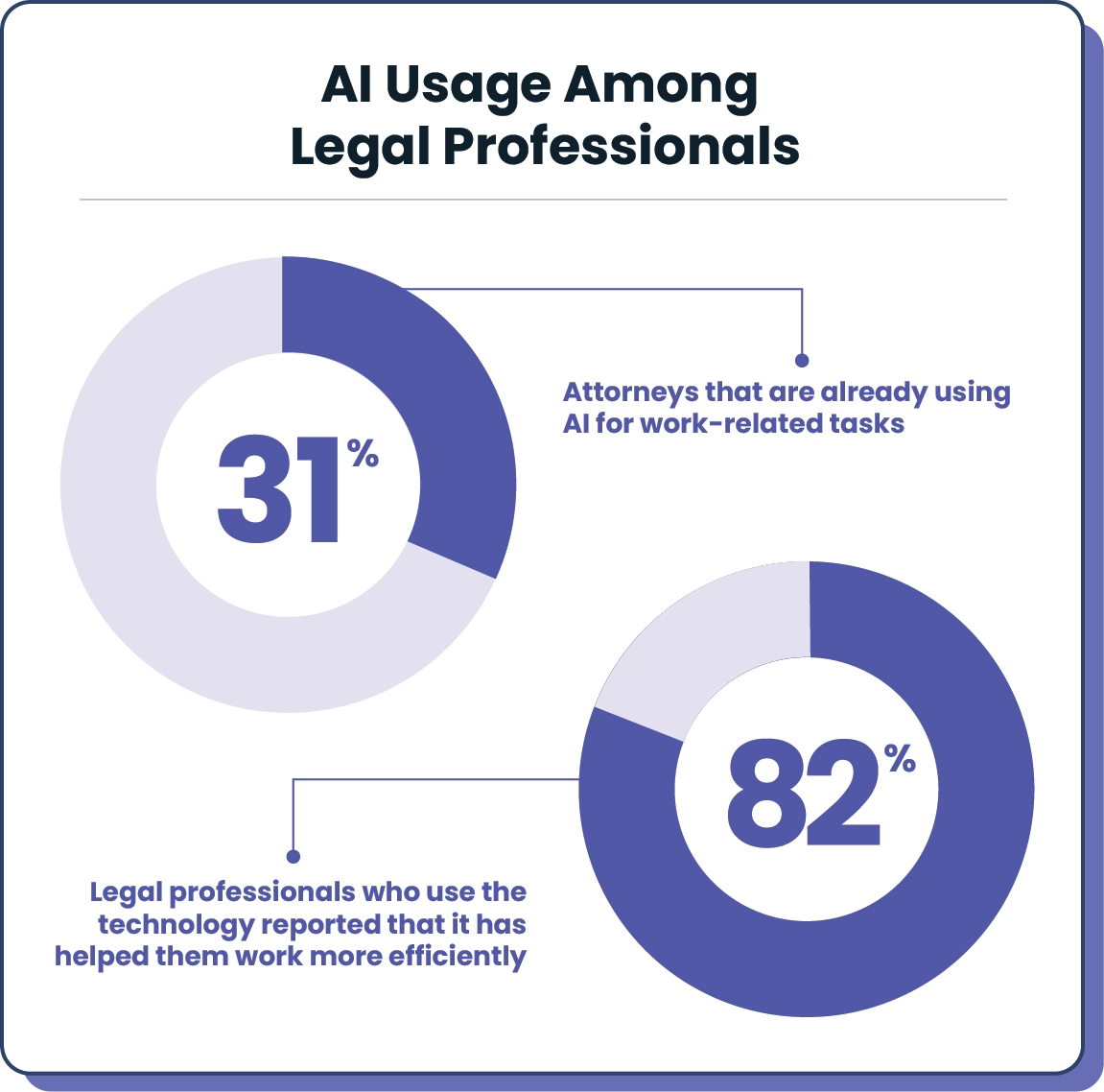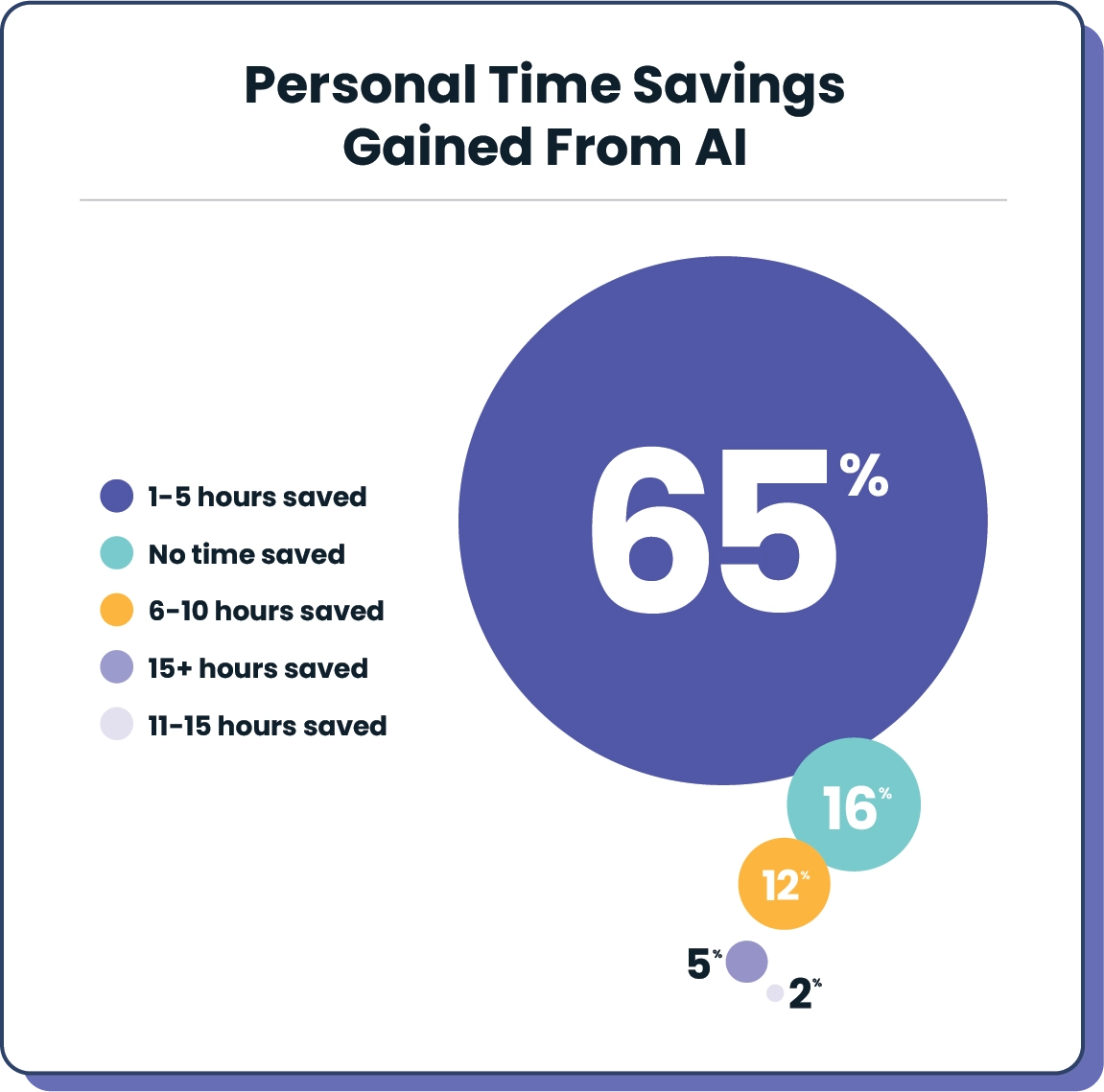In just a few years, artificial intelligence has emerged as a transformative technology in the legal profession. Firms are adopting AI tools that summarize complex documents, analyze contracts, manage client intake, and even assist with marketing. Some legal professionals have already made AI a regular part of their workflows, while others are cautiously testing the waters.
According to the 8amTM 2025 Legal Industry Report, 31% of attorneys are already using AI for work-related tasks, and 82% of legal professionals who use the technology reported that it has helped them work more efficiently.
The appeal is clear: AI can help lawyers complete tasks faster, reduce certain costs, and identify patterns in large datasets that would take hours to review manually. But its rapid adoption also brings challenges. Without proper oversight, these tools can create compliance risks, undermine accuracy, and damage client trust.
As AI becomes more deeply integrated into the legal field, attorneys need to understand not only its benefits but also its potential pitfalls. This article explores how AI is impacting the legal profession, examines the key pros and cons of AI in law, and offers guidance for responsible use.

How is AI impacting the legal field?
AI has already begun to reshape daily legal work. Firms of all sizes are finding practical ways to integrate legal AI tools into their operations, using the technology in different ways depending on available resources, caseloads, and client needs. Beyond everyday tasks, AI is also prompting changes in how firms approach staffing, pricing, and overall business strategy.
AI usage by firm size
Attorneys at solo practices and small firms are turning to AI to handle routine work more efficiently. Tools that assist with intake questionnaires, responses to discovery demands, and initial drafts of pleadings and motions allow attorneys to save time and dedicate more attention to clients—a benefit that’s especially valuable to firms without large support staff.
Mid-size firms are adopting AI for legal research, document review, and the due diligence process. Lawyers in these firms often juggle a steady flow of complex cases that may involve reviewing thousands of pages of contracts, discovery files, and regulatory documents. Legal AI software can sift through these materials quickly and flag relevant details, enabling attorneys to focus on strategy and case planning. This makes AI especially appealing for mid-size firms that must balance high-volume work with competitive fee structures.
Large firms are increasingly developing or licensing custom AI models. These advanced systems can run contract analytics, assess litigation risk, and even predict case outcomes based on historical data. Larger organizations also tend to have the infrastructure to deploy AI at scale, with dedicated IT and compliance teams monitoring security and performance.
Impact on firm business models
AI is reshaping how legal professionals think about billing. When tasks that once took hours can now be completed in minutes, business models based on billable hours become harder to sustain.
Flat fees—arrangements set upfront regardless of time spent—make the cost of legal services more predictable and transparent, which clients appreciate. Value-based billing is a fee arrangement in which a law firm charges clients based on the perceived or actual value of the legal services delivered, rather than the number of billable hours logged. Both models can help firms benefit from AI’s efficiency without eroding their revenue.
According to Wolters Kluwer’s 2024 Future Ready Lawyer Survey Report, 55% of law firms and 67% of corporate legal departments expect AI to reduce firms’ reliance on hourly billing, with many anticipating a shift toward alternative fee models.
The disadvantages of using AI in law firms
AI creates many new opportunities for legal practices, but it is not without risks. When adopted without safeguards, legal AI tools can expose firms to compliance issues, ethical violations, and reputational harm. Attorneys who rely too heavily on AI may also become vulnerable to errors that undermine client trust. Below are some disadvantages of using AI in the legal profession.
Limited contextual understanding
Even the most advanced AI systems are not capable of interpreting law in the same way that a human attorney does. Rather than drawing from a true understanding of legal nuance, case precedent, and jurisdictional rules, these tools are built to recognize and work with patterns in data.
For instance, an AI tool might fail to recognize that a particular statute is outdated or doesn’t apply to the case at hand—mistakes that a seasoned litigator would not overlook.
Data privacy and confidentiality issues
Many AI tools are cloud-based or process data on external servers. If a lawyer enters confidential client information into a public AI service, that information could be reused for model training or accessed in ways that violate ethical rules.
Even when firms use enterprise or subscription-based AI systems, they need to know where their data is stored, what security protections are in place, how and when the data is accessed, used, and shared, and who controls access. Without these precautions, firms risk violating professional conduct rules and jeopardizing client trust.
Ethical and professional responsibility concerns
Growing adoption of AI in the legal field also raises important ethical questions. As firms implement this technology, they need to stay mindful of their responsibilities to protect client confidentiality, supervise staff use of AI tools, and ensure compliance with professional standards.
In July 2024, the American Bar Association issued its first formal opinion on the ethical use of generative AI. The opinion tied AI use to several of the ABA’s Model Rules of Professional Conduct, including duties of competence (Rule 1.1), confidentiality (Rule 1.6), and supervision (Rules 5.1 and 5.3). Attorneys who neglect these obligations risk disciplinary action or malpractice claims if AI-related errors lead to client harm.
Risk of inaccuracy
Generative AI tools can produce convincing but incorrect information, often referred to as hallucinations. If a lawyer treats AI output as fact without review, they risk introducing flawed or even fabricated material into legal proceedings.
For instance, in June 2023, two attorneys were sanctioned after submitting a court filing that cited several fictitious cases that ChatGPT had inserted during the research process. The judge who issued the fine said the lawyers had “abandoned their responsibilities” by submitting non-existent judicial opinions.
The risk of inaccuracy extends beyond legal research. Using AI to draft contracts, prepare deposition summaries, or generate marketing content can lead to subtle errors. Left unchecked, those mistakes can misinform clients, weaken a case, or trigger compliance violations.
The advantages of using AI in legal practices
When used responsibly, AI can be a powerful complement to legal expertise. Instead of replacing attorneys, these tools handle routine work in the background, giving lawyers more bandwidth for strategic planning, client interaction, and business development. They also make it possible for firms to deliver services more quickly and consistently.
Increased efficiency and time savings
Efficiency is one of the clearest benefits of AI. Attorneys are using these tools to speed up correspondence drafting, brainstorming, research, and document creation—tasks that once consumed valuable hours.
According to the 8am 2025 Legal Industry Report, 65% of surveyed attorneys who regularly use AI reported saving 1 to 5 hours per week, 12% saved 6 to 10 hours, and 7% saved 11 or more hours weekly.
Another 2025 survey by Thomson Reuters estimated that generative AI could save the average legal professional up to 240 hours per year, or about $19,000 in billable time per attorney over the course of a year.

Cost reduction
AI-powered automation can also help firms lower labor costs and reduce reliance on external vendors. For example, a firm that adopts AI-powered automated document review tools may enable attorneys to manage discovery internally rather than hiring third parties. These savings can then be redirected toward growth initiatives or client-focused investments.
Improved accuracy and reduced human error
While hallucination risks remain a concern, AI can also serve as a defense against errors. Properly trained systems can flag inconsistencies or omissions that might slip through manual review. In contract analysis, for instance, an AI assistant might detect a missing arbitration clause or identify language that conflicts with a client’s standard terms. Paired with human oversight, this capability can help firms improve both accuracy and risk management.
Enhanced client experience
Clients often evaluate legal services not only on case outcomes but also on responsiveness and communication. AI-powered intake systems can simplify onboarding, while automated updates keep clients informed about case progress. Some firms also use chatbots to provide quick answers to common questions—such as office hours, document submission guidelines, or case statuses—helping clients feel supported around the clock.
Should your law firm use AI?
With legal AI companies offering such a wide range of solutions, deciding whether to adopt AI is not a simple yes-or-no question. The right approach depends on a firm’s needs, practice areas, and resources.
Here are a few questions for firms to consider when evaluating AI pros and cons:
Will this technology improve efficiency without diminishing the quality of our work?
What are the specific areas of our operations where AI could provide the most value?
How much time and money could we save by using AI to automate some administrative tasks?
Do we have the necessary infrastructure in place to implement AI securely and protect client data?
Are our attorneys and staff trained to identify and correct potential errors or compliance risks?
Tips for responsible AI use in legal practices
To gain the benefits of AI without exposing your firm to legal, ethical, or operational risks, it’s important to have a clear adoption plan. A structured approach ensures that attorneys and staff know which tools are appropriate, how they should be used, and what safeguards must be in place. If your firm is ready to move forward with AI, keep these implementation best practices in mind:
Instruct lawyers and support staff to review all AI output carefully. Treat AI-assisted research, document drafts, and summaries as a starting point, not a finished product.
Ensure confidential information is protected. Advise lawyers and support staff to avoid entering sensitive client data into tools that lack strong privacy protections.
Establish internal policies. Clearly define which AI tools are approved and how they may be used.
Train your team. Make sure attorneys, paralegals, and support staff understand AI’s benefits, limitations, and potential red flags.
Keep policies current. Regularly review your firm’s AI policies and the tools themselves to ensure they still meet ethical and security standards.
Firms that adopt these practices will be better positioned to see lasting benefits from AI while minimizing risk.
8am MyCase is here to support your AI journey
As AI adoption continues to grow in the legal profession, attorneys need solutions designed to meet the specific needs of their work. 8am MyCase offers AI tools that save time and improve the client experience without compromising accuracy or ethics.
MyCase IQ includes a legal writing assistant that suggests edits for clarity and tone, making it easier to draft professional communications. Automatic language translation helps lawyers correspond with Spanish-speaking clients. And with the Legal Document AI tool, legal professionals can scan lengthy documents and generate summaries of key details, enabling them to work efficiently while gaining actionable insights.
MyCase also provides helpful educational resources—including blog articles, webinars, and step-by-step guides—that give your team a clear roadmap to responsible AI adoption.
If you’d like to see how MyCase’s AI capabilities can support your firm, explore our AI tools or schedule a demo to experience them in action.
Legal AI FAQs
About the author

Rob HeidrickContent Writer
Rob Heidrick is a Content Writer for leading legal software brands, including MyCase, Docketwise, CASEpeer, and LawPay—the #1 legal payment processor. He covers the latest advancements in legal technology, financial wellness for law firms, and key industry trends.
